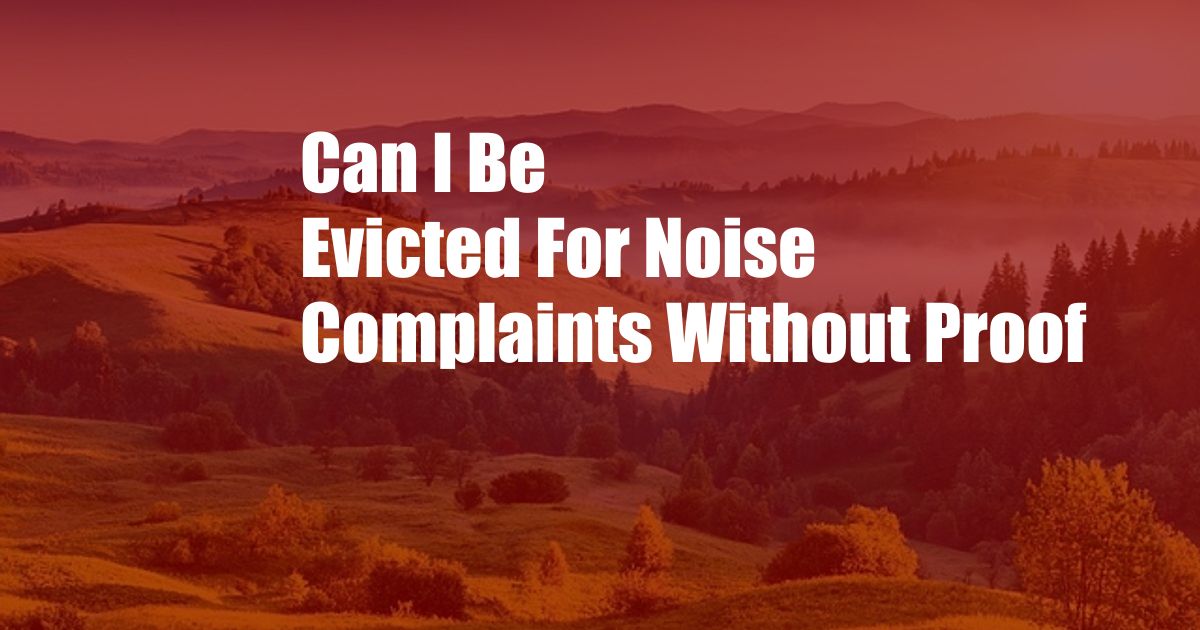
Can I Be Evicted for Noise Complaints Without Proof?
In the bustling tapestry of modern society, the sanctity of our homes is often under siege by noise pollution. From noisy neighbors to traffic clamor, the assault on our auditory senses can be relentless. But can a landlord evict a tenant solely based on noise complaints? The answer, as we shall explore, is a nuanced one, navigating a complex legal landscape and the delicate balance between a landlord’s property rights and a tenant’s right to quiet enjoyment.
The legal framework governing landlord-tenant relationships varies across jurisdictions, but certain principles hold true. Generally, a landlord cannot evict a tenant without a valid reason, such as nonpayment of rent or violation of lease terms. However, excessive noise can potentially rise to the level of a lease violation.
Establishing a Lease Violation
To establish a lease violation due to noise, the landlord must demonstrate that:
- The noise is excessive and unreasonable, and substantially interferes with the peaceful enjoyment of other tenants or neighbors.
- The tenant is responsible for causing the noise.
- The landlord has provided reasonable notice to the tenant regarding the noise issue and has given the tenant an opportunity to rectify the situation.
Determining whether noise is excessive and unreasonable is a fact-specific inquiry. Considerations include the time of day, duration, and frequency of the noise, as well as the nature of the surrounding neighborhood and the landlord’s reasonable expectations of quiet enjoyment.
Proof of Responsibility
The burden of proof lies with the landlord to establish the tenant’s responsibility for the noise. This can be challenging, as noise can often be difficult to trace to its source. Some landlords utilize noise monitoring devices or employ outside witnesses to gather evidence.
In cases where multiple tenants or neighbors complain about noise, the landlord may be able to establish a pattern of behavior that implicates a specific tenant. However, it is essential that the landlord provide clear and specific evidence of the noise source, rather than relying solely on general or hearsay complaints.
Reasonable Notice and Opportunity to Cure
Before initiating eviction proceedings, the landlord must provide reasonable notice to the tenant of the noise violation and afford the tenant an opportunity to correct the behavior. The notice should clearly state the specific noise concerns and the steps the tenant must take to resolve the issue.
The landlord must give the tenant a reasonable time to address the noise problem, considering factors such as the severity of the violation and the time necessary to implement effective noise mitigation measures. If the tenant fails to take reasonable steps to reduce the noise after receiving notice, the landlord may proceed with eviction proceedings.
Tips and Expert Advice
To minimize the risk of eviction for noise complaints, tenants should:
- Be considerate of neighbors and keep noise levels within reasonable limits.
- Address noise issues promptly by soundproofing noisy appliances or rugs, or adjusting noise-making activities to more reasonable hours.
- Communicate with neighbors to find mutually acceptable solutions, such as agreeing on quiet hours or designating noise-free zones.
- Document any efforts made to reduce noise levels, such as purchasing noise-dampening materials or hiring a contractor to soundproof their unit.
Landlords, on the other hand, should:
- Establish clear noise expectations in the lease agreement, specifying permissible noise levels and quiet hours.
- Respond promptly to noise complaints and investigate the source of the noise before issuing any notices.
- Provide specific and verifiable evidence of the noise violation to the tenant.
- Give the tenant a reasonable opportunity to resolve the noise issue before initiating eviction proceedings.
FAQs
Q: Can I be evicted for noise if it is not my fault?
A: It is unlikely, but not impossible. If the landlord can demonstrate that you are responsible for the noise, even if it was caused by a guest or pet, you may be subject to eviction.
Q: Can I contest an eviction notice for noise if I have proof of mitigating efforts?
A: Yes. If you have taken reasonable steps to reduce the noise and have evidence to support your efforts, you may be able to challenge the eviction in court.
Conclusion
Navigating noise complaints in landlord-tenant relationships can be complex. Landlords must balance their property rights with a tenant’s right to peaceful enjoyment, while tenants must respect the quiet enjoyment of others. By understanding the legal framework, establishing clear lease expectations, and fostering open communication, both parties can work together to create a harmonious living environment.
If you are interested in learning more about noise ordinances and legal remedies for noise complaints, please consult with an attorney or visit reputable online resources for further information.